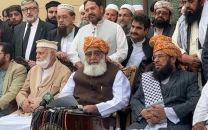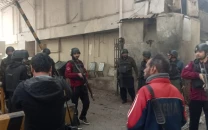Pakistan’s ‘patriot act’?: How fair is the new trial bill?
The proposed legislation paves the way for govt to tap phones, and use e-mails and text messages as proof.

Pakistan’s ‘patriot act’?: How fair is the new trial bill?
A proposed piece of legislation – the Investigation for Fair Trial Bill 2012 – is set to formally pave the way for the government to tap phones and use e-mails and text messages as proof in trials.
While the phones of politicians, government officials and journalists have been tapped for decades in Pakistan, the fresh legislation introduced in the National Assembly on October 8 sees this process being formalised.
Why now?
In its introduction to the bill, the government states that existing laws do not provide for or regulate advanced investigative techniques such as surveillance. There has been a considerable deal of criticism over existing criminal laws, but lawyers and prosecutors argue that even these are not implemented properly.
Who does it impact?
The law, if passed in its current form, would apply to Pakistanis in the country and abroad.
A sessions judge would be authorised to issue a warrant for surveillance of a citizen in the country to a government entity, including the Inter-Services Intelligence, Military Intelligence and the police.
The surveillance of Pakistanis living abroad is not possible without mutual legal assistance treaties. According to Barrister Zahid Jamil, Pakistan has continued to not sign or enact these treaties.
However, this law does not apply to members of parliament and provincial assemblies, unless the speaker of the assembly in question or the Senate chairperson permits a warrant to be issued.
What proof does the government need?
The Investigation for Fair Trial bill is vague on what proof a government agency would need to provide to obtain a warrant.
Officials may ask for a warrant if they believe a person is going to commit or plan a scheduled offence and will need to prepare a report. This report will be approved by the department’s head or a BPS-20 officer and then submitted to a judge. The offences that are included here are from a number of laws, including the Official Secrets Act and the Anti-Terrorism Act.
This means that if the government believes someone is leaking official secrets, they can ask for the suspect’s e-mail and phones to be tapped, and similarly, if it suspects that someone is planning a terrorist attack or making extortion demands. Currently, the police get access to data after making requests to the Inter-Services Intelligence.
The warrant – which can extend for up to six months – will be issued by the judge in his/her chambers and will not be a public record.
Who will provide this data?
The data will be given by ‘service providers’, such as telecom operators or internet service providers. They will have indemnity, which means citizens can’t sue them for handing over their data. A service provider who declines to provide information can be fined up to Rs10 million or jailed for two years.
What data can the government access?
According to the law, the government can access “data, information or material in any documented form ... through audio visual device, CCTV, still photography, bugging, observation or any mode of modern devices or techniques obtained under the Act ... documents, papers, pamphlets, booklets” for surveillance.
The government can also intercept “emails, SMS, internet protocol detail record, call detail record and any form of computer based or cell phone based communication. It also includes any means of communication using wired/wireless/internet protocol-based media/gadgetry.”
Leading the way to criminal proceedings
If the officer finds that the surveillance results prove that the person is abetting, conspiring or attempting to commit an offence, a First Information Report (FIR) will be lodged against him/her.
Will it work in court?
Abdul Maroof, a prosecutor at Karachi’s anti-terrorism courts, said that data was essential in prosecution and curbing the menace of terrorism, since terrorists were not only “well-equipped, but also well-literate.”
Maroof said the law would help prosecuting cases and would improve the police’s performance. “Investigation here starts after the registration of an FIR. Investigation should instead be done before, like it is abroad.”
While he believes sessions judges are capable and have a certain stature to be able to issue such warrants, “this would increase the burden of the existing sessions courts. A magistrate could be allocated in each district for this purpose, and there need to be guidelines for the reports.”
What’s in a law?
Given how leaked documents, phone conversations and even BlackBerry Messenger conversations have been used against government officials and politicians in the past, the law could easily pave the way for extensive political victimisation or effective trials, depending on which way one looks at it.
Barrister Zahid Jamil, an expert on cyber, surveillance and security related legislation, notes that “if the government is truly sincere and genuine in bringing in a legislation on wiretaps and surveillance, then it should seek the assistance of experts and ensure that both the definitions, enabling provisions and safeguard measures of legislation in the US and the UK ought to be reflected in this legislation, which they are currently not in the depth required.”
Jamil makes several points, including that immunity to parliamentarians puts them above the law and should then either be given to judges and parliamentarians or neither. “How can you have surveillance of parliamentarians who are corrupt?” he said. “This is like a National Reconciliation Ordinance [by] a government trying to save itself before it goes out of business.”
Jamil also said that since the legislation applies to intelligence services and asks them to go to a regular judge with no special rules or conditions, it would be a “disaster” from the intelligence point of view. “You need to give them the standard of legislation and safeguards that exist in the UK and the US.”
Thirdly, Jamil noted, the grounds on which the application for a wiretap is made should be well-defined in the legislation. “Not in a secret, notified gazette that isn’t available, but they should be in the statute and passed by parliament. Those grounds should be absolutely clear.” Jamil said that the document “doesn’t go deep enough to be legislation” and it’s imbalanced both against security agencies and citizens since it doesn’t have any safeguards.
The definitions in the legislation, he said, were “legally and technically appalling” and it appeared a “deliberate failure” on the part of the government to not incorporate existing standards in the law. Also, he noted that “surveillance, wiretaps and observation” should not be lumped together and be separated.
Jamil referenced the Supreme Court’s 1998 verdict that highlighted how surveillance should be conducted, and said the court should take immediate notice of the proposed new law. “We would have expected a democratic government to have at least done better than a dictator, than to have perpetuated the same violations of civil liberties and unfair trials,” he said. “The name given to this legislation is an oxymoron – it has absolutely nothing to do with trials.”
Warrants can be issued if officials believe someone is about to commit, aid or abet offences listed in these laws:
Pakistan Nuclear Regulatory Authority Ordinance 2001
Official Secrets Act 1923
Explosive Substances Act 1901
Prevention of Anti-National Activities 1974
Anti-Terrorism Act 1997
Security of Pakistan Act 1952
Surrender Illicit Arm Act 1991
Arms Act 1878
Prohibition of Private Armies Act 1974
National Command Authority Act 2010
Laws abroad
US – The USA PATRIOT Act [Uniting and Strengthening America by Providing Appropriate Tools Required to Intercept and Obstruct Terrorism Act]
“Congress passed the USA PATRIOT Act in response to the terrorists’ attacks of September 11, 2001. The Act gives federal officials greater authority to track and intercept communications, both for law enforcement and foreign intelligence gathering purposes. It vests the Secretary of the Treasury with regulatory powers to combat corruption of US financial institutions for foreign money laundering purposes.
It seeks to further close our borders to foreign terrorists and to detain and remove those within our borders. It creates new crimes, new penalties, and new procedural efficiencies for use against domestic and international terrorists. Although it is not without safeguards, critics contend some of its provisions go too far. Although it grants many of the enhancements sought by the Department of Justice, others are concerned that it does not go far enough.”
Source: Congressional Research Service
UK - Regulation of Investigatory Powers Act 2000
According to the UK Home Office, the law governs the use of covert techniques by public authorities and requires that “they do it in a way that is necessary, proportionate, and compatible with human rights.”
It is an “Act to make provision for and about the interception of communications, the acquisition and disclosure of data relating to communications, the carrying out of surveillance, the use of covert human intelligence sources and the acquisition of the means by which electronic data protected by encryption or passwords may be decrypted or accessed; to provide for Commissioners and a tribunal with functions and jurisdiction in relation to those matters, to entries on and interferences with property or with wireless telegraphy and to the carrying out of their functions by the Security Service, the Secret Intelligence Service and the Government Communications Headquarters; and for connected purposes.”
From November 2012 onwards, judicial approval will be required for local authorities before they use covert techniques. According to the Guardian, “The most controversial elements of the bill were the lack of oversight for the powers and the government’s decision to require ISPs to fit equipment that would allow the police and security services to monitor internet traffic and intercept email.”
Published in The Express Tribune, October 22nd, 2012.



















COMMENTS
Comments are moderated and generally will be posted if they are on-topic and not abusive.
For more information, please see our Comments FAQ